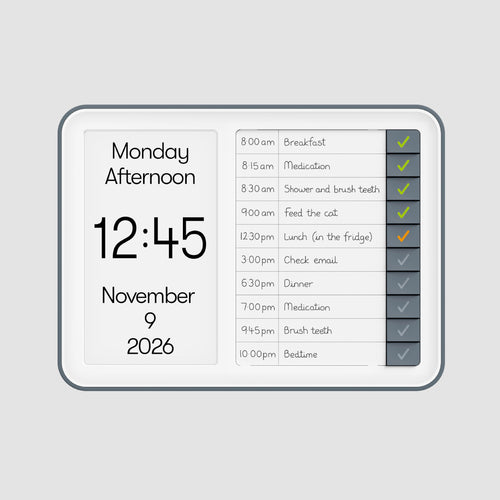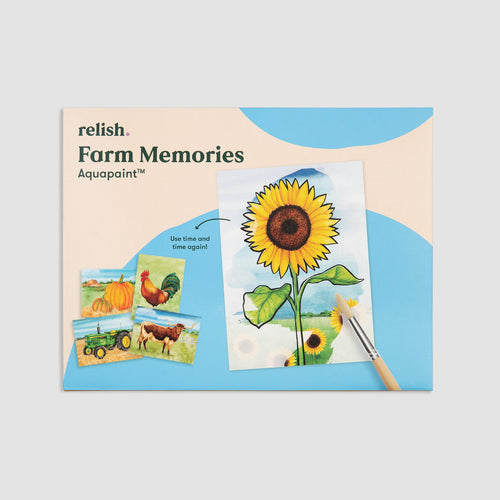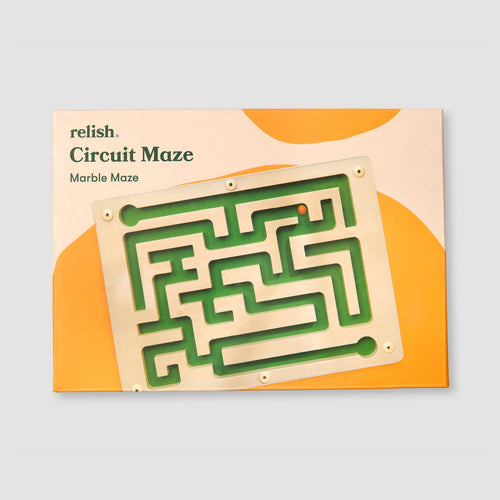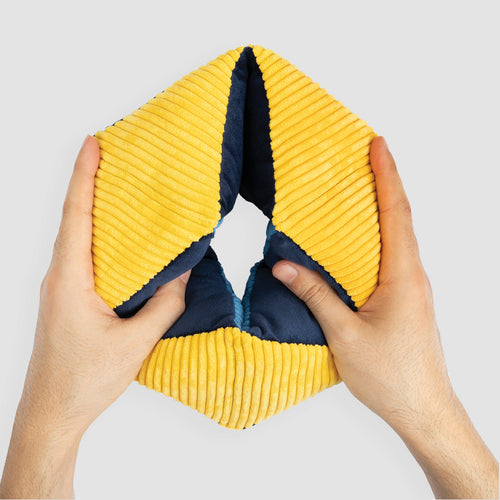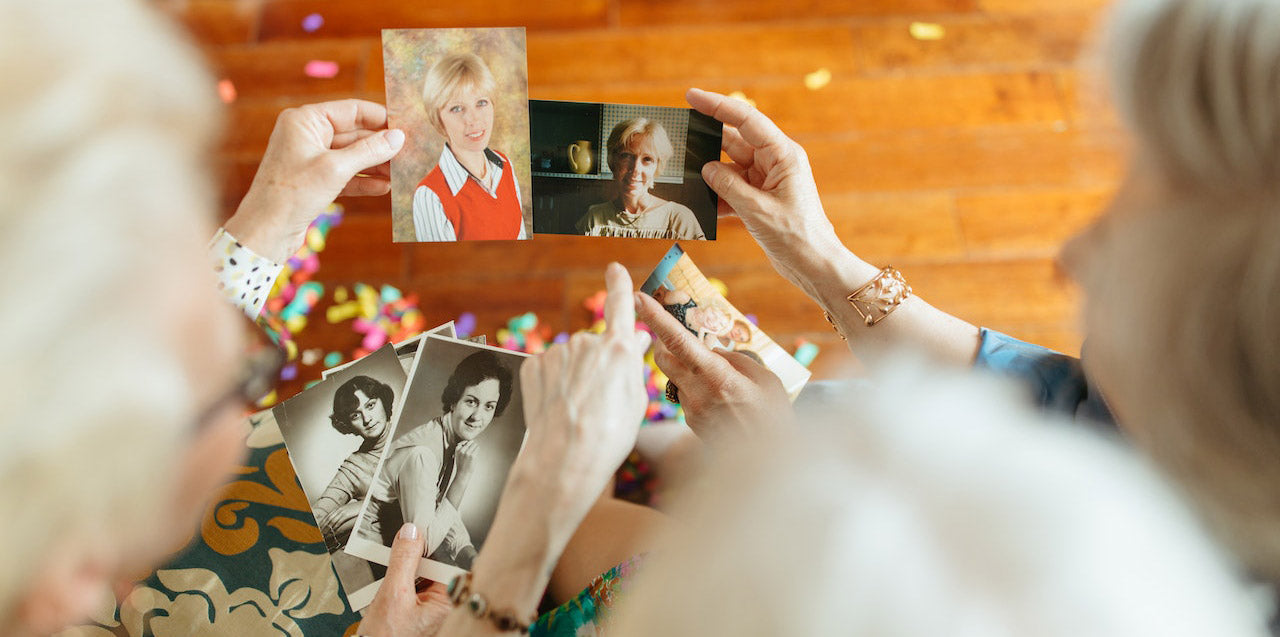‘Reminiscence’ means to enjoy recalling and remembering the past, such as pondering fond memories, like vacations, adventures, experiences, and stories from past events. Who doesn't love tapping into the warmth of nostalgia!?
For individuals living with dementia, it is typically easier to recall experiences from the past rather than newer memories. And with the support of reminiscence therapy, it is possible to do just that. Reminiscence therapy for dementia can offer individuals a sense of skill-building and self-confidence by reconnecting with experiences that they have already had.
Read on to understand the details and benefits of reminiscence therapy and how to implement this therapy for a person with dementia.
What Is Reminiscence Therapy For Dementia?
Reminiscence therapy invokes all five senses - sight, touch, taste, smell, and sound - to guide people with dementia to recall various events, key figures in their life, and places from their past. This non-pharmacological intervention can be done in a formalised setting with a therapist or in a more casual setting with caregivers. It can also be done in a group setting or one-to-one.
Reminiscence therapy uses props, various sensory stimulants, and talk therapy to dig up past experiences and recall memories. It invokes personal history and personal interests and encourages conversation.
Through discussion and asking simple questions about music, art, scent, taste, texture, items, and conversations, you can bring up cherished memories with a loved one. Reminiscence therapy can support the person living with dementia in sharing memories from childhood, young adulthood and into family life, and express feelings of happiness and joy, all inspired by their past.
Outcomes of reminiscence therapy treatment include:
- Decreased isolation
- Increased sense of self
- Elevated self-esteem
- Sense of comfort
- Reduced tendency towards depression and low mood
- Improved communication skills
- Decreased stress
- Connection with loved ones
- Improved quality of life
When Should Reminiscence Therapy Be Used?
Reminiscence therapy can be used with anyone with dementia and experiencing memory loss. People with Alzheimer’s typically struggle with recent memories. Still, they can recall their life story, especially childhood, due to the many times they have recited certain stories and memories throughout their life.
There is, at present, no cure for dementia but reminiscence therapy can support individuals' quality of life and improve memory and cognitive skills.
Benefits Of Reminiscence Therapy For Dementia
There is a wide range of reminiscence therapy benefits. It strives to evoke memories and stimulate mental activity while improving overall well‐being. As people recall past events, feelings and pleasant memories can be brought up, helping to alleviate low moods.
Here are some of the benefits of reminiscence therapy for dementia:
- Improved confidence: Through reminiscence, the chance to speak about and reflect on the past allows individuals to feel a sense of peace and happiness and to feel more assured. Talking about happy times can be a wonderful relief from possible boredom, too, while aiding people to feel successful and confident in their life experiences, positive relationships and accomplishments.
- Reduced anxiety: Having the chance to discuss and share joyful life events can aid in reducing anxiety, stress, wandering, frustration, and more.
- Encourages togetherness: Reminiscence therapy invites individuals to share meaningful things in their life rather than just listening to others talk. Plus, reliving life-affirming moments spent with family or recounting stories about important close relationships, can help preserve family stories and joyful memories for many more years to come.
How Is Reminiscence Therapy Performed?
Here is a general outline of how reminiscence therapy works:
- Make a list of all the things that you know are meaningful to the person with dementia’s identity. For example, do you know the answer to any of the following:
- What job did they do?
- What were their hobbies?
- What important life events did they have?
- Do you know their favourite colour or song?
- Did they have a close bond with a pet?
-
Gather together various items that relate back to the person’s identity. This can include pictures, songs, specific scents, textures, videos or anything else that may spark a memory for the person with dementia.
-
Use the items to start a conversation. It’s best done in a quiet space, free from distractions. Try to ask open-ended questions, but if this is too tricky you can try “yes” or “no” questions to make the task more simple. Try and ask questions that incorporate the five senses, too.
The person leading the therapy can be anyone that the person with dementia trusts, such as a family member, caregiver or healthcare professional.
Can You Use Reminiscence Therapy For Depression in Dementia?
Reminiscence therapy can support personal quality of life and self-confidence and as a consequence can reduce overall depressive symptoms and anxiety, improving mental health. Connecting with old memories can spark a sense of happiness that brings warmth and hope. It can help people with dementia understand themselves better and feel peaceful.
How Effective Is Reminiscence Therapy For Dementia?
According to various studies, reminiscence therapy has decreased depression in people living with dementia while increasing their quality of life immediately after the intervention. Therefore, we recommend reminiscence activities be done regularly.
Reminiscence Activities For People With Dementia
We have curated a few of Relish’s top activities to support reminiscence in dementia for you to try.
1. The Baking Cupboard
This product, which there is no wrong way to use, invites individuals to speak about baking and what it means to them. With magnetic pieces, users can pick up and examine familiar baking objects, and place them within the baking cupboard (a magnetic board!). For those who are passionate bakers, this activity should help spark fond memories of baking cakes and cookies for family to enjoy.
There are also questions included to help with engaging in conversation, such as “Tell me about the types of things you would bake?” It's a beautiful way to reflect on baking.

Suitable for mid-late stages of dementia.
2. Handyman
This product uses a magnetic picture board and various items related to home renovation and work tools. It helps users reminisce and create unique scenes and activities to thoughtfully spark conversation about DIY projects. Users can pick up and examine the tools or organise the toolbox. Interactive and fun, there is no pressure to do anything “right” or “wrong.”

Suitable for mid-late stages of dementia.
3. The Book Lover’s Quiz
Using favourite novels, stories, or authors, create a no-pressure quiz around literature to discuss the ins and outs of your loved one’s favourite books! It's a lovely way to spark meaningful conversations about childhood and books that were important throughout life.
If this activity is too tricky, why not take some books down from the shelf and enjoy the covers or read through some favourite passages or character descriptions.
Encourage Trips Down Memory Lane With Relish
The benefits of enjoying a stroll down memory lane through reminiscence therapy are tremendous and undoubtedly worthwhile. It can not only support better cognition but the chance to connect with your loved ones deeply. To guide you on the journey with nostalgia and reminiscence, check out Relish’s range of reminiscence products that support this nod to the past. Enjoy the process, and watch how it can truly invoke beautiful responses from someone you care about living with dementia.
